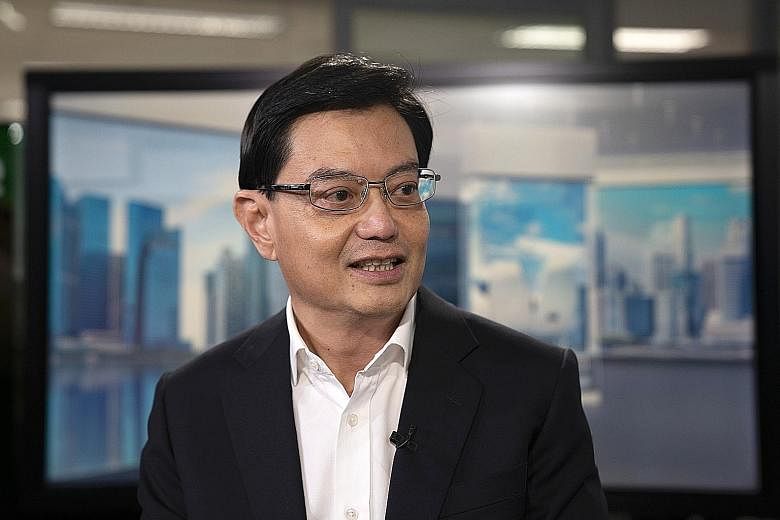Singapore may need to review its economic growth projections for next year as a trade spat between the world's two biggest economies increases uncertainty and crimps business investment, said Finance Minister Heng Swee Keat.
"In the short run, the impact is not fully felt yet," with Singapore retaining its growth forecast for this year at 2.5 per cent to 3.5 per cent, Mr Heng said in an interview last Friday with Bloomberg Television's Ms Haslinda Amin.
"But any trade tension that sets back globalisation will (not only) affect everyone, including the countries that are directly involved, but also (cause) collateral damage right across all economies."
Mr Heng made the comments ahead of this week's Bloomberg New Economy Forum in Singapore, where policymakers and business executives will gather to discuss the changing dynamics in the world as economic influence shifts from the West to the East.
In South-east Asia, nations are grappling with a potent storm of economic challenges: a high-stakes tariff battle between the United States and China, global monetary policy tightening, a strengthening dollar and the risk of capital outflows.
Singapore, an international trading hub that benefits from trade flows and the movement of goods between the region's manufacturing centres, the US and Europe, has already seen exports ease this year.
Asked if Singapore might have to reassess its yet-to-be announced projections for 2019, Mr Heng said, "indeed", pointing to the International Monetary Fund's downgrade of its global forecast.
Economic agencies and the central bank have been in close touch with businesses and are looking at whether the projections need to be "changed or revised", he said.
"We are beginning to see the effects of this in terms of this increased uncertainty, and reduced investment by businesses," he said.
While 2018 growth is likely to come in at the upper half of the projection, "as to next year, it depends on how the situation continues to develop in the next few months, because many of these investment decisions that ought to be taken will be affected."
Beyond 2019, a prolonged trade war would severely disrupt the global supply chain, causing long-term growth challenges for countries as the "global production frontier" is diminished, Mr Heng said.
However, he noted that Asia's structural growth drivers are strong. "Look at the population, the rising middle class, the embrace of multilateralisation and free trade, and also increasingly the efforts in technology and innovation.
"What we hope to do is to position Singapore as a global Asian node of technology, innovation and enterprise." The country's competitive edge stems from its connectivity to the global economy and Asia, its adherence to international standards and rule of law, and its openness, he said.
"Our protection of intellectual property and the trust that people have in Singapore as a business centre is so important," he added.
Mr Heng noted that the trade dispute had businesses feeling concerned about their supply chain.
"In the short run, there will be some of those immediate changes" and "the natural evolution of the supply chain is now facing a severe shock because of this change".
He said that countries in the region "will have to make the best out of this untidy situation" by accelerating the development of infrastructure, connectivity and other areas.
"Otherwise the supply chain becomes very inefficient, and every one of us is going to pay for it."
The world breaking into regional trade blocs can be harmful, Mr Heng noted, though bilateral and regional agreements can be used as building blocks towards global agreements, while building confidence in the system and giving economies the time to make structural adjustments. Such moves could then pave the way for multilateral agreements.
"I think it will serve all countries best if we have agreement at the level of the World Trade Organisation," said Mr Heng, adding that he thinks a rules-based global multilateral system serves the interests of countries better.
Mr Heng also touched on Singapore's Budget and tax structure during the interview. The key priorities for the Budget include economic restructuring - with innovation being a key part of policymakers' work - as well as infrastructure development, he said.
As for tax structure, he has had many discussions with his staff on areas such as the changes needed to spending and revenue patterns.
"We believe that we should not be planning on the basis of just year to year, but we need to take a longer-term view of some of our needs."
Taxing labour less and capital more "is one of the options that we are looking at" but "we have a range of possible instruments", he said.
Consumption tax will still be a major part of the tax base over the next five-year horizon, he added.
BLOOMBERG

